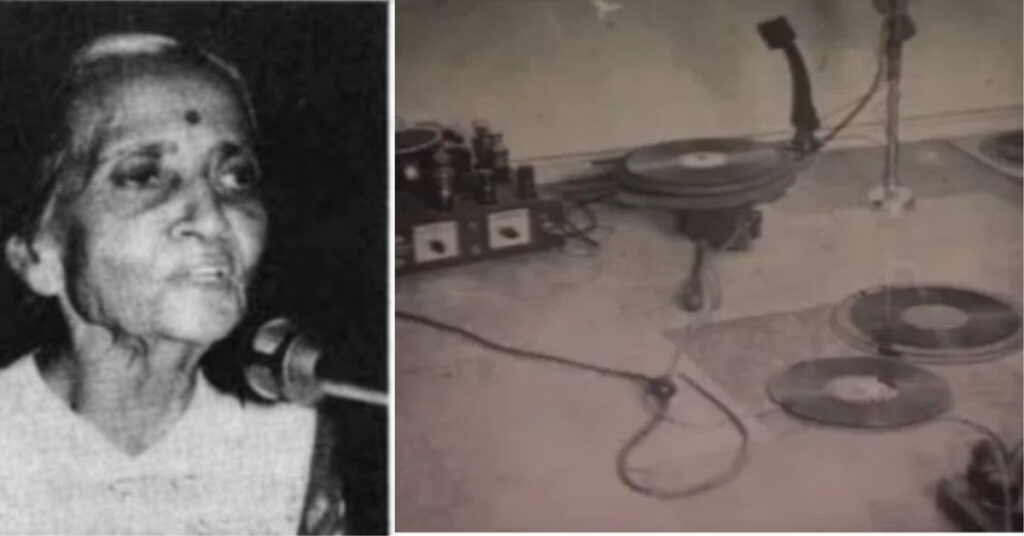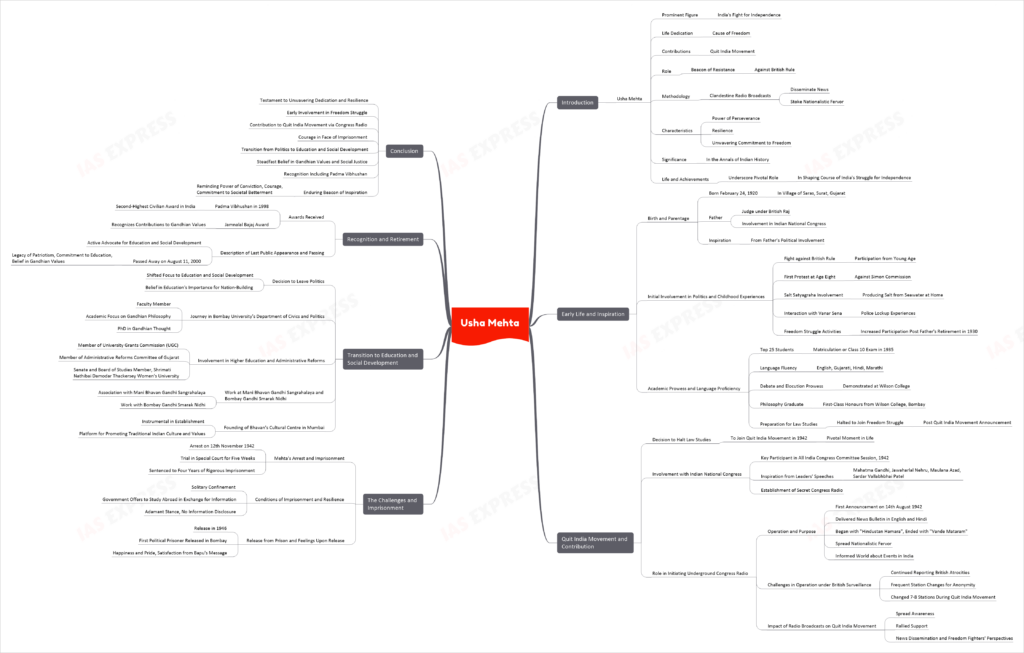Usha Mehta (1920-2000): Broadcasting Freedom in British India

I. Introduction
Usha Mehta, a prominent figure in India’s fight for independence, dedicated her life to the cause of freedom. Known for her contributions to the Quit India Movement, she served as a beacon of resistance against British rule, using clandestine radio broadcasts to disseminate news and stoke nationalistic fervor. Her story is a testament to the power of perseverance, resilience, and unwavering commitment to the cause of freedom, proving her to be a significant figure in the annals of Indian history. Her life and achievements underscore the pivotal role she played in shaping the course of India’s struggle for independence.
II. Early Life and Inspiration
A. Birth on February 24, 1920, and her father’s involvement in Indian National Congress
- Born in the village of Saras, situated near Surat in the state of Gujarat.
- Father was a judge under the British Raj, but was involved in the Indian National Congress.
- Father’s involvement in politics served as a source of inspiration for Usha from a young age.
B. Initial involvement in politics and childhood experiences with the Vanar Sena
- Participated in the fight against British rule from a young age.
- At the age of eight, she took part in her first protest against the Simon Commission.
- During the Salt Satyagraha, she would bring seawater to her home and produce salt out of it.
- Found herself in the police lockup with other little children of the Vanar Sena.
- After her father’s retirement in 1930, she was allowed to participate more fully in freedom struggle activities.
C. Academic prowess – fluent in four languages, top student, and debate excellence at Wilson College
- Ranked one of the top 25 students in her matriculation or Class 10 exam in 1935.
- Fluent in four languages – English, Gujarati, Hindi, and Marathi.
- Demonstrated prowess in debate and elocution at Wilson College.
- Graduated with first-class honours in Philosophy from Wilson College, Bombay.
- Began preparing to study for law, but halted her studies to join the freedom struggle with the announcement of the Quit India Movement.
III. Quit India Movement and Contribution
A. Decision to halt law studies to join the Quit India movement
- Usha Mehta decided to halt her law studies to join the Quit India Movement in 1942.
- The announcement of the Quit India Movement was a pivotal moment that led her to dedicate her full energies towards the freedom struggle.
B. Involvement with the Indian National Congress and work with other freedom fighters
- Usha Mehta was a key part of the All India Congress Committee session in 1942.
- Heard powerful speeches by leaders like Mahatma Gandhi, Jawaharlal Nehru, Maulana Azad, and Sardar Vallabhbhai Patel.
- These speeches served as a source of inspiration for her to establish the secret Congress Radio.
C. Role in initiating the underground Congress Radio
- Description of the radio’s operation and purpose
- Launched the first announcement of “Congress Radio” on 14th August 1942.
- Would deliver the news bulletin in both English and Hindi, beginning with the song “Hindustan Hamara” and ending with “Vande Mataram”.
- The purpose of the radio was to spread nationalistic fervor and inform the world about the events taking place in India.
- Challenges faced in keeping the radio station operational under British surveillance
- Despite strict surveillance by British authorities, Usha Mehta’s station continued to report on the atrocities committed by the British.
- The station had to frequently change its position to remain anonymous and hidden from the British radar.
- The team changed around 7-8 stations during the Quit India Movement.
- Impact of the radio broadcasts on the Quit India movement
- The Congress Radio played a crucial role in spreading awareness and rallying support for the Quit India Movement.
- It was a powerful tool for disseminating news and the perspectives of the freedom fighters.
- Despite eventual capture and imprisonment, Usha Mehta’s work with Congress Radio had a lasting impact on the Quit India movement.
IV. The Challenges and Imprisonment
A. Description of Mehta’s arrest and subsequent imprisonment
- On 12th November 1942, as they were hosting a show from Girgaon, the police arrested Usha Mehta along with her associates.
- She was tried in a special court for five weeks and sentenced to four years of rigorous imprisonment.
B. Conditions of imprisonment and her resilience in the face of adversity
- During the imprisonment, Usha Mehta was kept in solitary confinement.
- She was enticed by the government with offers to study abroad in exchange for information about her fellow freedom fighters.
- Despite these pressures, she remained adamant and did not disclose any information, showcasing her strong character and dedication to the cause.
C. Release from prison and feelings upon release
- Usha Mehta was released in 1946, becoming the first political prisoner to be released in Bombay.
- Upon her release, she said, “I came back from the jail happy and proud because I had the satisfaction of carrying Bapu’s message, ‘Do or Die’ and having contributed my humble might to the cause of freedom.” This statement underlines her unwavering commitment to India’s struggle for independence.
V. Transition to Education and Social Development
A. Decision to leave politics and shift focus to education
- After the independence of India, Usha Mehta decided to leave politics and dedicated her life to education and social development. This shift in focus came from her belief in the importance of education for nation-building.
B. Journey in the Bombay University’s Department of Civics and Politics
- Usha Mehta returned to the University of Bombay as a faculty member in the Department of Civics and Politics.
- Her academic focus was on Gandhian philosophy, which she shared with her students.
- She attained a PhD in Gandhian thought from the University of Bombay.
C. Involvement with University Grants Commission (UGC), Administrative Reforms Committee of Gujarat, and the Shrimati Nathibai Damodar Thackersey Women’s University
- She served as a member of the University Grants Commission (UGC), contributing to policy-making in higher education.
- Usha Mehta was a member of the Administrative Reforms Committee of Gujarat, which aimed to bring about effective changes in the administrative system.
- She also served on the Senate and the Board of Studies of Shrimati Nathibai Damodar Thackersey Women’s University, contributing her expertise and knowledge for the betterment of women’s education.
D. Work at Mani Bhavan Gandhi Sangrahalaya and Bombay Gandhi Smarak Nidhi
- She was associated with the Mani Bhavan Gandhi Sangrahalaya, a museum and historical building dedicated to Gandhi in Mumbai.
- Usha Mehta worked with the Bombay Gandhi Smarak Nidhi, an institution dedicated to preserving the memory and teachings of Mahatma Gandhi.
E. Founding of the Bhavan’s Cultural Centre in Mumbai
- Usha Mehta was instrumental in the founding of the Bhavan’s Cultural Centre in Mumbai, a hub for the cultural and intellectual growth of the city’s residents. It became a platform for promoting traditional Indian culture and values.
VI. Recognition and Retirement
A. Awards received, including the Padma Vibhushan and Jamnalal Bajaj Award
- Usha Mehta was honored with several awards recognizing her significant contributions to India’s freedom struggle and post-independence development.
- In 1998, she was bestowed with the Padma Vibhushan, the second-highest civilian award in India, by the government of India.
- She was also the recipient of the Jamnalal Bajaj Award. This award is given annually to individuals who have made significant contributions to Gandhian values.
B. The Passing of Usha Mehta
- Usha Mehta continued to be an active advocate for education and social development throughout her life.
- She passed away on August 11, 2000, leaving behind a legacy of steadfast patriotism, commitment to education, and unwavering belief in Gandhian values.
VII. Conclusion
Dr. Usha Mehta’s story is a testament to the power of unwavering dedication to a cause and the resilience of the human spirit. Her early involvement in India’s freedom struggle, her vital contribution to the Quit India Movement through the Congress Radio, and her enduring courage in the face of imprisonment highlight her exceptional commitment to her country. Equally remarkable is her transition from politics to education and social development, where she left a significant impact in various capacities. Despite the challenges she faced, her belief in Gandhian values and her commitment to social justice remained steadfast. The recognition she received, including the prestigious Padma Vibhushan, underscores the lasting influence of her work. Usha Mehta’s life and work serve as an enduring beacon of inspiration, reminding us of the power of conviction, courage, and commitment to societal betterment.


